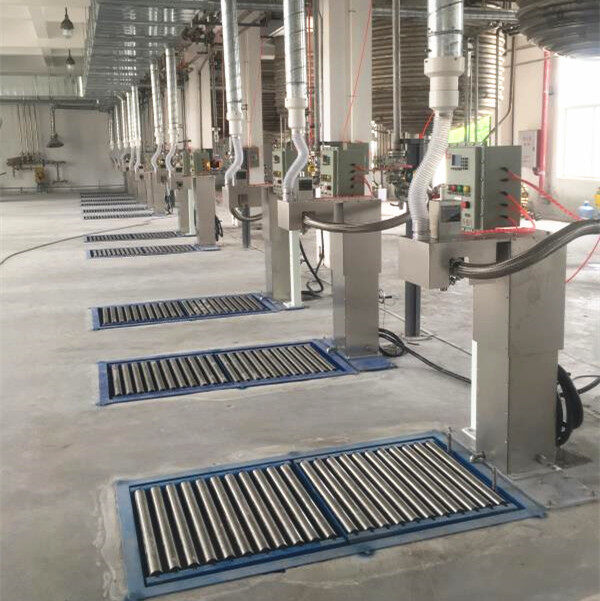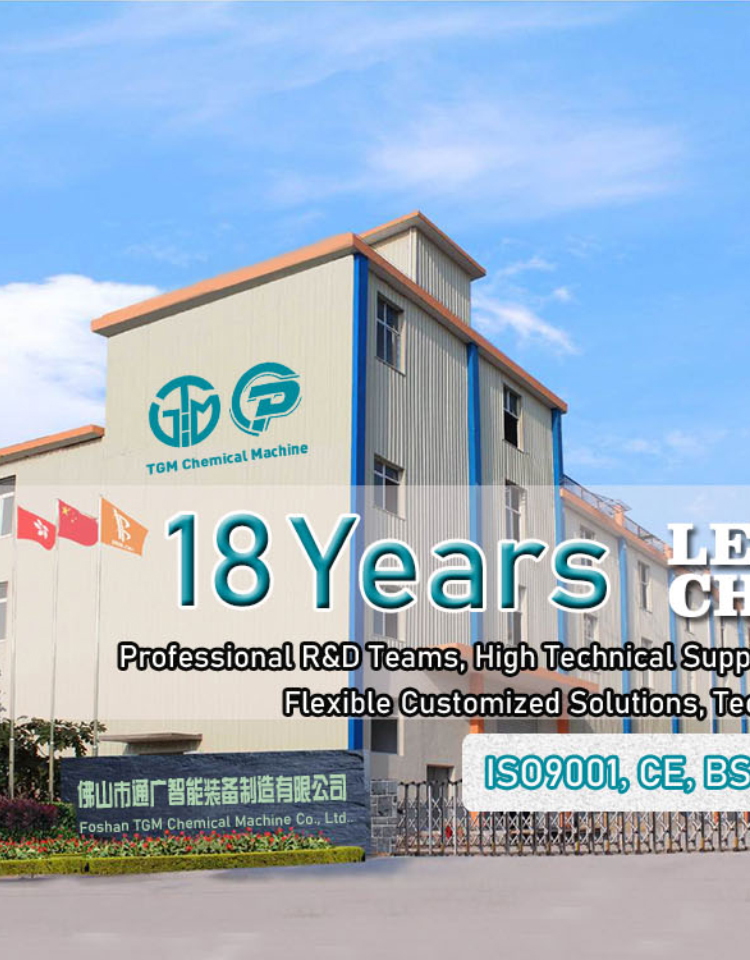Email cannot be empty
Password cannot be empty
Email format error
Email cannot be empty
Email already exists
6-20 characters(letters plus numbers only)
The password is inconsistent
Email format error
Email cannot be empty
Email does not exist
6-20 characters(letters plus numbers only)
The password is inconsistent


Polyester Resin Production Line: Enhancing Efficiency in Manufacturing
The polyester resin production line is a crucial part of modern manufacturing, enabling the mass production of this versatile material used in a wide range of industries. Polyester resin, known for its durability, resistance to corrosion, and cost-effectiveness, has found applications in everything from coatings and adhesives to construction materials and composite manufacturing. Setting up a high-quality polyester resin production line can optimize production efficiency and enhance product quality, making it an essential investment for businesses in the resin industry.
In this blog, we’ll explore the key components of a polyester resin production line, how it works, and why investing in this type of machinery can provide significant advantages. We’ll also delve into some tips for selecting the right polyester resin production line for your needs, as well as maintenance practices that can help you extend the life of your equipment.
What is Polyester Resin?
Before we dive into the specifics of the polyester resin production line, it's important to understand what polyester resin is and why it is such a valuable material in various industries.
Polyester resin is a synthetic polymer that forms through the reaction of an alcohol with an organic acid. Its chemical structure gives it excellent strength, flexibility, and resistance to environmental factors such as moisture and chemicals. Because of these properties, polyester resin is widely used in industries like construction, automotive, marine, and electronics.
Key Components of a Polyester Resin Production Line
A polyester resin production line typically consists of several essential components that work together to ensure the efficient production of high-quality resin. Understanding these components can help businesses optimize their operations and achieve better results.
1. Raw Material Storage and Handling System
The first step is the storage and handling of raw materials. This includes the storage of monomers, catalysts, and additives, which are essential for the chemical reaction that produces polyester resin. Automated handling systems are often employed to reduce human error and increase efficiency.
2. Mixing and Blending Equipment
Once the raw materials are stored and prepared, they are moved into mixing and blending units. These machines are designed to combine the materials in precise ratios to ensure consistent quality. The mixing process is critical, as any inconsistencies can result in a subpar product.
3. Polymerization Reactors
The polymerization reactor is the heart. This is where the chemical reaction takes place to transform raw materials into polyester resin. Temperature and pressure control in the reactor are vital for achieving the desired molecular structure and properties of the resin.
4. Cooling and Solidification System
After the polymerization process, the molten polyester resin needs to be cooled and solidified. This is usually done through cooling belts or chillers. Controlling the cooling process ensures that the resin maintains its structural integrity and quality.
5. Cutting and Packaging Machinery
Finally, the solidified polyester resin is cut into smaller pieces or granules for easy packaging and transportation. The resin can then be shipped to manufacturers who use it in various applications. Packaging systems can be automated to streamline this final step in the production process.
The Importance of Automation in Polyester Resin Production Lines
Automation plays a critical role in modern polyester resin production lines. By implementing advanced control systems, manufacturers can achieve higher levels of efficiency, consistency, and safety. Automation reduces the need for manual intervention, minimizing the risk of human error, and allows for better monitoring and control of the entire production process.
Benefits of a Polyester Resin Production Line for Manufacturers
Investing in a polyester resin production line can provide numerous benefits for manufacturers. These include:
1. Increased Production Efficiency
With a well-designed polyester resin production line, manufacturers can significantly increase their production capacity. Automated systems and continuous production methods allow for higher output with minimal downtime.
2. Cost-Effectiveness
While setting up the production line requires an initial investment, it leads to cost savings in the long run. Automation reduces labor costs, and the ability to produce resin in large quantities helps lower per-unit costs.
3. Consistent Product Quality
A properly configured production line ensures consistent product quality. This is especially important in industries where polyester resin is used in high-performance applications, such as aerospace or automotive manufacturing.
4. Reduced Waste
By optimizing the mixing, polymerization, and cooling processes, the production line minimizes waste, which is both economically and environmentally beneficial.
Choosing the Right Polyester Resin Production Line
Selecting the right polyester resin production line for your business requires careful consideration of several factors. Here are some tips to help you make the best choice:
1. Capacity Requirements
One of the most important factors to consider is the production capacity of the line. Depending on the size of your operation, you may need a line that can produce large volumes of resin in a short amount of time. It’s essential to choose a system that meets your current needs while also allowing for future expansion.
2. Customization Options
No two businesses are exactly alike, so it’s important to select a production line that can be customized to suit your specific requirements. Look for manufacturers that offer flexible design options and the ability to integrate additional features as needed.
3. Energy Efficiency
Energy costs are a significant consideration in any manufacturing operation. An energy-efficient production line can help reduce operational costs while minimizing the environmental impact of your production processes.
4. Maintenance and Support
Like any piece of machinery, a polyester resin production line requires regular maintenance to ensure optimal performance. Choose a supplier that offers comprehensive maintenance services and technical support to keep your line running smoothly.
Common Challenges in Polyester Resin Production
Despite the many benefits, there are several challenges that manufacturers may face. Being aware of these challenges can help businesses take proactive steps to address them.
1. Temperature Control Issues
Maintaining the correct temperature throughout the polymerization process is critical. If the temperature is too high or too low, it can affect the chemical reaction and result in poor-quality resin.
2. Raw Material Quality
The quality of raw materials used in the production process directly impacts the final product. Impurities or inconsistencies in raw materials can lead to defects in the resin.
3. Equipment Maintenance
Regular maintenance is essential to keep the production line running efficiently. Failing to maintain equipment can lead to unexpected breakdowns and costly repairs.
Future Trends in Polyester Resin Production Lines
As technology continues to evolve, we can expect several advancements in the production lines. These include:
1. AI and Machine Learning
Artificial intelligence (AI) and machine learning are making their way into manufacturing processes, including polyester resin production. These technologies can optimize production by predicting potential issues, improving efficiency, and reducing waste.
2. Sustainable Production
Sustainability is a growing concern for manufacturers. Future polyester resin production lines may incorporate more environmentally friendly processes, such as the use of bio-based raw materials and energy-efficient machinery.
3. Improved Automation Systems
Automation systems will continue to improve, allowing for even greater levels of precision and control in the production process. This will help manufacturers meet the increasing demand for high-quality polyester resin in various industries.
Conclusion
A polyester resin production line is a vital asset for any manufacturer looking to produce high-quality polyester resin at scale. From raw material handling to polymerization, cooling, and packaging, the production line ensures that each step of the process is optimized for efficiency and consistency. By investing in advanced production line technology, businesses can reduce costs, increase output, and ensure that their products meet the highest industry standards.
Whether you’re setting up a new production line or upgrading an existing one, choosing the right equipment and maintaining it properly is key to long-term success in polyester resin manufacturing. As the industry evolves, staying ahead of technological advancements will ensure that your production line remains competitive and sustainable in the futur

